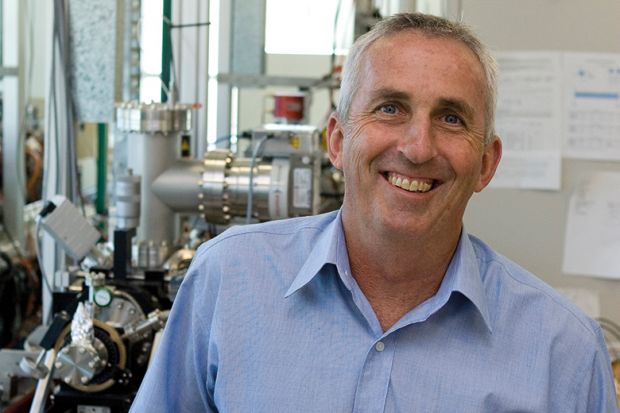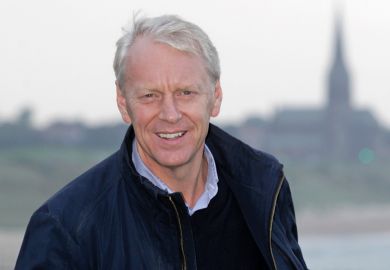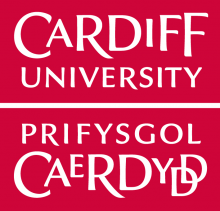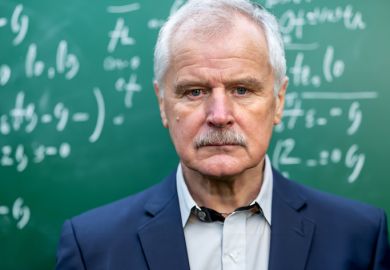Stephen Buckman is an atomic physicist and former director of the Research School of Physics and Engineering at the Australian National University (ANU). He held postdoctoral positions at the universities of Manchester and Colorado Boulder before joining ANU. In September, he was announced as the next executive director for physical sciences, engineering, mathematics and information sciences at the Australian Research Council (ARC).
Where and when were you born?
Sydney, Australia, in 1952.
How has this shaped you?
I think that my birthplace, and time, have actually had quite a profound effect on my “sense of place”. Sydney in the 1950s and 1960s was a very interesting place to grow up and, as a family, we travelled quite a bit in my first five years as my father was a flight engineer for Qantas, and then was seconded to the nascent Pakistan [International Airlines] in the mid-1950s, so we spent time living in Karachi and England. I have very fond memories of my youth. In Sydney, we always lived near the sea, which was a real privilege when I think about life in Sydney these days. When not at school, I spent most of my time at the beach, surfing and enjoying the freewheeling beach culture, and that became a major part of my young life and continues to be an influence in some respects.
How should funding councils balance applied and blue-sky research?
It is an age-old debate but one that can largely be put to bed with funding councils now offering a broad range of diverse opportunities across the spectrum, from fundamental to applied research. I am a great believer in the enabling ability of fundamental research for the nation’s economy. There is also much evidence of unforeseen, serendipitous outcomes from this research, outcomes that would not arise from an applied focus. However, it is incumbent upon us, as distributors and users of public funds, to also ensure that we foster an environment of entrepreneurship among our younger scientists such that they can be agile enough to see, and realise, opportunities for translational and applied research outcomes from their work.
In uncertain economic times, how important is it for nations to continue to invest in research?
Absolutely critical...and perhaps there is no better example in the developed world than Australia. The Australian economy has often been characterised as “riding on the sheep’s back” – a euphemism for our reliance on primary production, be it wheat, wool, coal or iron ore. Recent times have shown us that this reliance is short-sighted and that a narrow-based economy is a high-risk option in uncertain periods. All sides of politics seem to realise this and there has been an increased push to diversify the economy through innovation and development, and much of that can undoubtedly come from the academic sector, with the right balance of commercial and corporate support.
With the uncertainty after the referendum on the European Union, do you see the UK’s global research position weakening?
I certainly hope that this is not the case, but there is also no doubt that there are challenging times ahead for UK research as a result of the proposed exit from the EU. However, researchers are a resilient bunch and it would not be the first time that international research cooperation has had to struggle and innovate to prosper.
How vital is it to have free mobility for students and academics?
It is critical...particularly for younger academic staff. International relationships and collaborations have been such a key part of my own career, I cannot imagine it any other way. We also should not underestimate the part that such mobility plays in advancing international relationships.
What has changed most in global higher education in the past 10 years?
The biggest change has been the “internationalisation” of education. With the major first-world players reaching out into the developing countries, perhaps for not entirely altruistic reasons, there has been a significant raising of the bar of the standard of education delivery, and expectations, across the globe. Asia is perhaps the best example of this, and this period has seen many Asian institutions rise in world university rankings to a point where they now pose a major competitive force to older, more established institutions.
What advice would you give to your younger self?
Definitely not to “sweat the small stuff”. As an experimental scientist, one can have (some argue should have) a tendency to be a perfectionist, certainly in relation to laboratory work. This can carry over into all aspects of your life and can be an impediment to the way that one deals with challenges, be they big or small. I once had some sage advice from an older colleague about how to handle challenges and personal problems – basically, if they were not likely to be a problem in a week’s time, they were not worth any significant emotional effort. I wish I had followed that more closely.
What’s your biggest regret?
That my father never saw or met his two grandsons. This was not anyone’s fault, just circumstances, but I think that he would have been a significant, positive influence on their young lives.
What kind of undergraduate were you?
My early years are probably best forgotten or certainly not spoken about. I reacted badly to the freedom university presented after the regimentation of 1960s high school life. However, my latter years were very focused, and I was a rather diligent student and I worked quite hard – as I had to.
Appointments
René Lindstädt has been appointed head of Cardiff University’s School of Law and Politics. Professor Lindstädt, an expert in political economy among other subjects, joined the school on 1 September. He also took up a professorship of law and politics. Professor Lindstädt has previously taught at the University of Essex, Stony Brook University, in New York, and Trinity College Dublin. In his new role, he will take a strategic overview of the multidisciplinary school. “As head of school, my main goal will be to capitalise and build on the excellent individual reputations of our three departments to make the school a trailblazer in the UK and Europe for interdisciplinary education and research in law and politics,” Professor Lindstädt said.
Sandra Heidinger is the new chair of Universities Human Resources. Ms Heidinger, who was previously director of human resources at the University of Strathclyde, took up the position in October. She has been involved with UHR at board level since 2012 and has more than 25 years’ experience in the area. In her new position, Ms Heidinger aims to tackle complex challenges ahead for universities. “There are many issues and challenges facing the sector,” she said. “There’s the teaching excellence framework, the apprenticeship levy, and discovering what Brexit might mean for global talent retention and attraction. But there’s never been a better time for HR to lead. It’s time for us to step up to the plate.”
Kevin Bales has joined the University of Nottingham as professor of contemporary slavery in the School of Politics and International Relations.
Hilary Boulding, principal of the Royal Welsh College of Music and Drama, has been appointed president of Trinity College, Oxford. Ms Boulding takes over in August 2017.
Nader Azarmi, a senior British Telecom research scientist, has been appointed visiting professor at the University of East Anglia’s School of Computing Sciences.
POSTSCRIPT:
Print headline: HE & me
Register to continue
Why register?
- Registration is free and only takes a moment
- Once registered, you can read 3 articles a month
- Sign up for our newsletter
Subscribe
Or subscribe for unlimited access to:
- Unlimited access to news, views, insights & reviews
- Digital editions
- Digital access to THE’s university and college rankings analysis
Already registered or a current subscriber? Login












